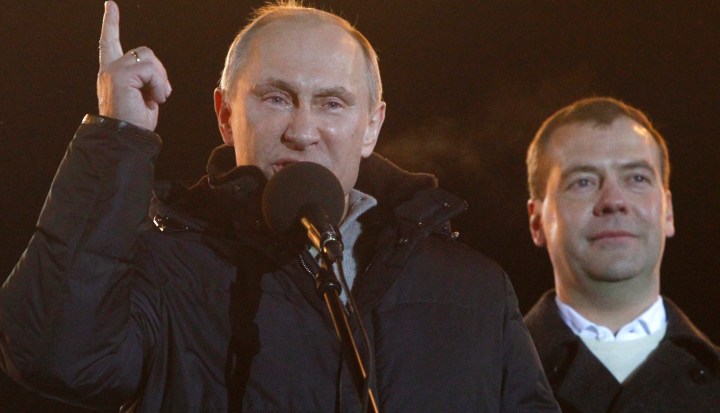Newsdeck
Russia threatens tough response if US backs rights bill

Russia warned the United States on Thursday to expect a tough response if the U.S. Congress passes "unfriendly and provocative" legislation designed to punish Russian officials for human rights violations. By Steve Gutterman.
The Russian Foreign Ministry said U.S.-Russian ties were sure to suffer if lawmakers backed a move directing the U.S. government to deny visas to Russian officials involved in the detention, abuse or death of Sergei Magnitsky, a lawyer who died in jail in 2009.
“Such a step will unavoidably have a negative effect on the whole range of Russian-U.S. relations,” Foreign Ministry spokesman Alexander Lukashevich told a news briefing.
“We will certainly not leave the introduction of essentially anti-Russian visa and financial sanctions without consequences,” he said. “We will have to react, and react toughly, depending on the final version of this unfriendly provocative act.”
Lawmakers in the U.S. House of Representatives brushed off the threat as they began debate on the legislation as part of a broader package to extend “permanent normal trade relations,” or PNTR, to Russia.
“Tomorrow marks the third anniversary of Sergei Magnitsky’s death and it is outrageous … that this kind of action in this 21st century still exists in a country that claims to be a democracy,” said Representative David Dreier, the Republican chairman of the House Rules Committee.
“It is horrendous and it is unacceptable,” Dreier said.
Magnitsky, who was arrested in 2007 after exposing a massive tax fraud, has become a symbol of corruption and the abuse of Russians who challenge the authorities. Adoption of the bill could undermine efforts to smooth relations at the start of President Barack Obama’s new term.
The U.S. Congress must approve PNTR to ensure that American companies receive all the market-opening benefits of Russia’s entry into the World Trade Organization in August.
U.S. business backs the combined trade and human rights bill out of a belief that the benefits from approval of PNTR will outweigh negative fallout from the Magnitsky portion of the legislation.
“The impact that we’re going to get out of the Russia PNTR legislation in terms of our rights in the WTO puts us on such a better playing field in that market,” said Linda Dempsey, a top official at the National Association of Manufacturers.
Lauren Airey, who also works for the manufacturers group, said it expected a “very strong bipartisan” vote in the House on Friday.
The bill would then go the Senate, where supporters are optimistic it will be approved. Obama is expected to sign the bill, even though the White House initially wanted legislation that did not contain the human rights sanctions provisions.
LINKING TRADE AND HUMAN RIGHTS
The Russian Foreign Ministry did not specify how Russia would react to passage of the Magnitsky bill, under which any Russian officials accused of involvement in the case would have assets they held in U.S. banks frozen.
Russian President Vladimir Putin has welcomed Obama’s re-election and said he wants to improve ties and increase trade, but has made clear he will not tolerate criticism from the United States about human rights.
Lukashevich used tough language to condemn the state of human rights in the United States.
“Considering very crude violations of human rights in the United States itself, including the practical legalisation of torture and the indefinite holding of inmates without trial in special CIA prisons and at the Guantanamo base (in Cuba), the United States has no moral right to preach or moralise to other countries,” he said.
Russia joined the WTO after 18 years of negotiations with strong support from the Obama administration, whose push to bring Russia into the global trade rules body was part of the U.S. president’s first-term “reset” of relations with Moscow.
Establishing PNTR requires lawmakers to lift a Cold War-era provision, the Jackson-Vanik amendment, that tied favourable U.S. tariffs on Russian goods to the rights of Soviet Jews.
The amendment is outdated, but U.S. lawmakers are reluctant to remove it without passing legislation to keep pressure on Moscow over their human rights concerns, which have deepened since Putin returned to the presidency in May.
Lukashevich said Russian-U.S. relations were moving in a positive direction but added that it could “very easily evaporate, unfortunately.”
Russian officials have indicated Moscow might respond in kind by barring entry to Americans deemed to have violated human rights. Other moves cannot be ruled out.
Magnitsky was jailed in 2008 on suspicion of tax evasion and fraud, charges colleagues say were fabricated by police investigators he had accused of stealing $230 million from the state through fraudulent tax refunds. The Kremlin’s own human rights council has said he was probably beaten to death. DM
Photo: Vladimir Putin and Dmitry Medvedev (Reuters)




















 Become an Insider
Become an Insider